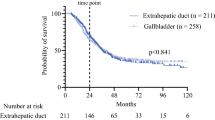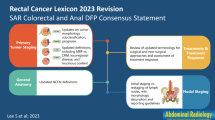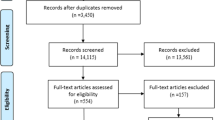Abstract
Background and objective
The current study aimed to explore the factors influencing early progression (EP) and late progression (LP) in locally advanced rectal cancer (LARC) patients.
Methods
The patients were classified into EP and LP groups using one year as a cutoff. The random survival forest model was utilized to calculate the probability of time-to-progression. Besides, inverse probability of treatment weighting (IPTW) analysis and the Surveillance, Epidemiology, and End Results (SEER) were conducted to validate our results.
Results
Our study revealed that PNI, CEA level, and pathological stage were independent prognostic factors for PFS both in EP group and LP group. For EP group patients, Group 1 had the highest probability of progression at the 9th month of follow-up, while Group 2 exhibited the highest probability at the 6th month. Group 3, on the other hand, showed two peaks of progression at the 4th and 8th months of follow-up. As for LP group patients, Groups 4, 5, and 6 all exhibited peaks of progression between the 18th and 24th months of follow-up. Furthermore, our results suggested that PNI was also an independent prognostic factor affecting OS in both EP group and LP group. Finally, the analysis of IPTW and SEER database further confirmed our findings.
Conclusions
Our results indicated a significant correlation between immune and nutritional status with PFS and OS in both EP and LP groups. These insights can aid healthcare professionals in effectively identifying and evaluating patients' nutritional status, enabling them to develop tailored nutrition plans and interventions.



Similar content being viewed by others
Data availability
The data that support the findings of this study are available from the corresponding author upon reasonable request.
Abbreviations
- RC:
-
Rectal cancer
- LARC:
-
Locally advanced rectal cancer
- EP:
-
Early progression
- LP:
-
Late progression
- IPTW:
-
Inverse probability of treatment weighting
- SEER:
-
Surveillance, Epidemiology, and End Results
- TNM:
-
Tumor-node-metastasis
- AJCC:
-
American joint Committee on cancer
- BMI:
-
Body mass index
- PNI:
-
Prognostic nutritional index
- NRI:
-
Nutritional risk index
- PAR:
-
Platelet to albumin ratio
- CEA:
-
Carcinoembryonic antigen
- MRF:
-
Mesorectal fascia involvement
- EMVI:
-
Extra-mural vascular invasion
- PC:
-
Postoperative chemotherapy
- PR:
-
Postoperative radiotherapy
- VCE:
-
Vascular cancer embolus
- PI:
-
Perineural invasion
- TD:
-
Tumor deposit
- PFS:
-
Progression-free survival
- OS:
-
Overall survival
- RSF:
-
Random survival forest
- HR:
-
Hazard ratio
- CI:
-
Confidence interval
- C-index:
-
Concordance-index
- SMD:
-
Standardized mean difference
References
Sung H, Ferlay J, Siegel RL, Laversanne M, Soerjomataram I, Jemal A et al (2021) Global Cancer Statistics 2020: GLOBOCAN Estimates of Incidence and Mortality Worldwide for 36 Cancers in 185 Countries. CA Cancer J Clin 71:209–249
Araghi M, Soerjomataram I, Jenkins M, Brierley J, Morris E, Bray F et al (2019) Global trends in colorectal cancer mortality: projections to the year 2035. Int J Cancer 144:2992–3000
Wallin U, Rothenberger D, Lowry A, Luepker R, Mellgren A (2013) CEA - a predictor for pathologic complete response after neoadjuvant therapy for rectal cancer. Dis Colon Rectum 56:859–868
Lai CL, Lai MJ, Wu CC, Jao SW, Hsiao CW (2016) Rectal cancer with complete clinical response after neoadjuvant chemoradiotherapy, surgery, or “watch and wait.” Int J Colorectal Dis 31:413–419
Fleshman J, Branda ME, Sargent DJ, Boller AM, George VV, Abbas MA et al (2019) Disease-free survival and local recurrence for laparoscopic resection compared with open resection of stage ii to iii rectal cancer: follow-up results of the ACOSOG Z6051 randomized controlled trial. Ann Surg 269:589–595
Voss RK, Lin JC, Roper MT, Al-Temimi MH, Ruan JH, Tseng WH et al (2020) Adjuvant chemotherapy does not improve recurrence-free survival in patients with stage 2 or stage 3 rectal cancer after neoadjuvant chemoradiotherapy and total mesorectal excision. Dis Colon Rectum 63:427–440
van Gestel YR, de Hingh IH, van Herk-Sukel MP, van Erning FN, Beerepoot LV, Wijsman JH et al (2014) Patterns of metachronous metastases after curative treatment of colorectal cancer. Cancer Epidemiol 38:448–454
Bockelman C, Engelmann BE, Kaprio T, Hansen TF, Glimelius B (2015) Risk of recurrence in patients with colon cancer stage II and III: a systematic review and meta-analysis of recent literature. Acta Oncol 54:5–16
Tobert CM, Hamilton-Reeves JM, Norian LA, Hung C, Brooks NA, Holzbeierlein JM et al (2017) Emerging impact of malnutrition on surgical patients: literature review and potential implications for cystectomy in bladder cancer. J Urol 198:511–519
Marshall KM, Loeliger J, Nolte L, Kelaart A, Kiss NK (2019) Prevalence of malnutrition and impact on clinical outcomes in cancer services: A comparison of two time points. Clin Nutr 38:644–651
Lu S, Liu Z, Zhou X, Wang B, Li F, Ma Y et al (2020) Preoperative fibrinogen-albumin ratio index (FARI) is a reliable prognosis and chemoradiotherapy sensitivity predictor in locally advanced rectal cancer patients undergoing radical surgery following neoadjuvant chemoradiotherapy. Cancer Manag Res 12:8555–8568
Feliciano EMC, Kroenke CH, Meyerhardt JA, Prado CM, Bradshaw PT, Kwan ML et al (2017) Association of systemic inflammation and sarcopenia with survival in nonmetastatic colorectal cancer: results from the C SCANS study. JAMA Oncol 3:e172319
Antoun S, Baracos VE, Birdsell L, Escudier B, Sawyer MB (2010) Low body mass index and sarcopenia associated with dose-limiting toxicity of sorafenib in patients with renal cell carcinoma. Ann Oncol 21:1594–1598
Lee JL, Yu CS, Kim TW, Kim JH, Kim JC (2015) Rate of pulmonary metastasis varies with location of rectal cancer in the patients undergoing curative resection. World J Surg 39:759–768
Chang YT, Tsai HL, Chen YC, Li CC, Huang CW, Chen PJ et al (2023) Clinicopathological features and oncological outcomes of early and late recurrence in stage III colorectal cancer patients after adjuvant oxaliplatin-based therapy. J Oncol 2023:2439128
Lu S, Liu Z, Wang B, Li F, Meng Y, Wang J et al (2021) High CFP score indicates poor prognosis and chemoradiotherapy response in LARC patients. Cancer Cell Int 21:205
Hsueh SW, Liu KH, Hung CY, Kuo YC, Tsai CY, Hsu JT et al (2019) Significance of the Glasgow Prognostic Score in Predicting the Postoperative Outcome of Patients with Stage III Gastric Cancer. J Clin Med 8
Filip B, Scarpa M, Cavallin F, Cagol M, Alfieri R, Saadeh L et al (2015) Postoperative outcome after oesophagectomy for cancer: nutritional status is the missing ring in the current prognostic scores. Eur J Surg Oncol 41:787–794
Watanabe M, Iwatsuki M, Iwagami S, Ishimoto T, Baba Y, Baba H (2012) Prognostic nutritional index predicts outcomes of gastrectomy in the elderly. World J Surg 36:1632–1639
Kanda M, Fujii T, Kodera Y, Nagai S, Takeda S, Nakao A (2011) Nutritional predictors of postoperative outcome in pancreatic cancer. Br J Surg 98:268–274
Iseki Y, Shibutani M, Maeda K, Nagahara H, Ohtani H, Sugano K et al (2015) Impact of the preoperative controlling nutritional status (CONUT) score on the survival after curative surgery for colorectal cancer. PLoS ONE 10:e0132488
Lin EY, Pollard JW (2004) Role of infiltrated leucocytes in tumour growth and spread. Br J Cancer 90:2053–2058
Levitt DG, Levitt MD (2016) Human serum albumin homeostasis: a new look at the roles of synthesis, catabolism, renal and gastrointestinal excretion, and the clinical value of serum albumin measurements. Int J Gen Med 9:229–255
Franch-Arcas G (2001) The meaning of hypoalbuminaemia in clinical practice. Clin Nutr 20:265–269
Yang Y, Gao P, Chen X, Song Y, Shi J, Zhao J et al (2016) Prognostic significance of preoperative prognostic nutritional index in colorectal cancer: results from a retrospective cohort study and a meta-analysis. Oncotarget 7:58543–58552
Sun K, Chen S, Xu J, Li G, He Y (2014) The prognostic significance of the prognostic nutritional index in cancer: a systematic review and meta-analysis. J Cancer Res Clin Oncol 140:1537–1549
Mohri Y, Inoue Y, Tanaka K, Hiro J, Uchida K, Kusunoki M (2013) Prognostic nutritional index predicts postoperative outcome in colorectal cancer. World J Surg 37:2688–2692
Jian-Hui C, Iskandar EA, Cai ShI, Chen CQ, Wu H, Xu JB et al (2016) Significance of Onodera’s prognostic nutritional index in patients with colorectal cancer: a large cohort study in a single Chinese institution. Tumour Biol 37:3277–3283
Patil PS, Saklani A, Gambhire P, Mehta S, Engineer R, De’Souza A et al (2017) Colorectal cancer in India: an audit from a tertiary center in a low prevalence area. Indian J Surg Oncol 8:484–490
Bausys A, Kryzauskas M, Abeciunas V, Degutyte AE, Bausys R, Strupas K et al (2022) Prehabilitation in modern colorectal cancer surgery: a comprehensive review. Cancers (Basel) 14
Weimann A, Braga M, Carli F, Higashiguchi T, Hübner M, Klek S et al (2021) ESPEN practical guideline: clinical nutrition in surgery. Clin Nutr 40:4745–4761
Arends J, Bachmann P, Baracos V, Barthelemy N, Bertz H, Bozzetti F et al (2017) ESPEN guidelines on nutrition in cancer patients. Clin Nutr 36:11–48
Arends J, Baracos V, Bertz H, Bozzetti F, Calder PC, Deutz NEP et al (2017) ESPEN expert group recommendations for action against cancer-related malnutrition. Clin Nutr 36:1187–1196
Kumpf VJ, de Aguilar-Nascimento JE, Diaz-Pizarro Graf JI, Hall AM, McKeever L, Steiger E et al (2017) ASPEN-FELANPE Clinical guidelines. JPEN J Parenter Enteral Nutr 41:104–112
Acknowledgements
We thank all the investigators and patients who participated in the present study.
Funding
This work was supported by the Joint Funds for the National Clinical Key Specialty Construction Program (Grant No. 2021), the Fujian Provincial Clinical Research Center for Cancer Radiotherapy and Immunotherapy (Grant No. 2020Y2012), and Fujian Clinical Research Center for Radiation and Therapy of Digestive, Respiratory and Genitourinary Malignancies (Grant No. 2021Y2014).
Author information
Authors and Affiliations
Contributions
YY, JW, HW, JQ, CL, and LH designed this study. YY, HW, SW, YG, and LS contributed to the data collection. YY, HW, and JQ analyzed the data. JW, CL, and LH supervised the study. YY, HW, and JQ wrote the manuscript. All authors read and approved the final manuscript.
Corresponding authors
Ethics declarations
Ethical approval and consent to participate
The current study was approved by the ethics committee of Fujian Medical University Cancer Hospital, Fuzhou, China and conducted in accordance with the principles of the Declaration of Helsinki and its amendment. All patients provided written informed consent prior to treatment, and all the information was anonymized prior to analysis.
Consent for publication
The manuscript has been approved by all authors for publication.
Competing interests
The authors report that they have no conflicts of interest pertaining to this work.
Additional information
Publisher's Note
Springer Nature remains neutral with regard to jurisdictional claims in published maps and institutional affiliations.
Junxin Wu, Cheng Lin, and Liang Hong contributed equally as corresponding authors to this manuscript
Supplementary Information
Below is the link to the electronic supplementary material.
Rights and permissions
Springer Nature or its licensor (e.g. a society or other partner) holds exclusive rights to this article under a publishing agreement with the author(s) or other rightsholder(s); author self-archiving of the accepted manuscript version of this article is solely governed by the terms of such publishing agreement and applicable law.
About this article
Cite this article
Yu, Y., Wu, H., Qiu, J. et al. Analysis of risk characteristics for early progression and late progression in locally advanced rectal cancer patients: a large population-based and validated study. Support Care Cancer 32, 340 (2024). https://doi.org/10.1007/s00520-024-08546-8
Received:
Accepted:
Published:
DOI: https://doi.org/10.1007/s00520-024-08546-8




